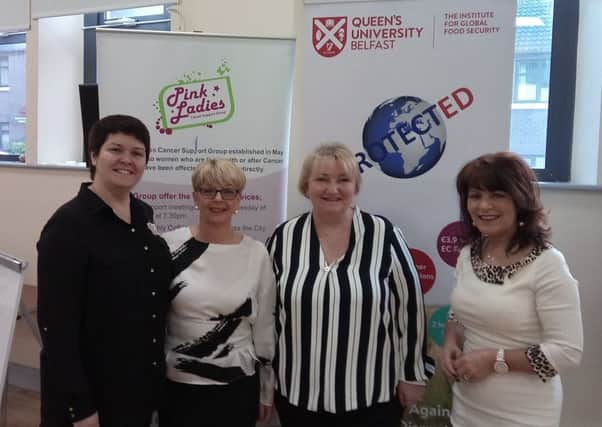Pioneering chemical research and potential impact of Brexit


Dr. Lisa Connolly, a Reader in Toxin Food Safety at the Institute for Global Food Security within the School of Biological Sciences at Queen’s University Belfast, is leading a pioneering, €4m international project to investigate whether natural toxins and man-made chemicals are creating potentially dangerous mixtures that affect people’s natural hormones and cause major illnesses such as cancer, obesity, diabetes or infertility.
The four-year Marie Curie Innovative Training Network project PROTECTED (Protection against Endocrine Disruptors) is funded by the European Commission and began in January 2017. Its primary focus involves training a team of world class researchers in developing ways of dealing with this global challenge.
Advertisement
Hide AdAdvertisement
Hide AdDr. Connolly, whose background is in cancer research and detecting chemicals in the food chain and environment, spoke at an event hosted by the Pink Ladies to mark World Cancer Day 2018. The event was staged at Bishop Street Community Centre.
Dr Connolly said: “While not all chemicals are bad, in fact many contribute positively to our modern lives, we need to know which ones are unsafe. Currently there is a world-wide shortage of researchers who can assess the impact of potentially dangerous natural and man-made endocrine disrupting chemicals and their mixtures on the hormone system which controls important functions within the body such as growth, development and fertility. Endocrine disruptors are suspected factors and sometimes proven agents behind several major human diseases, poor productivity in agricultural animals and stress upon ecosystems. If we can identify chemicals and mixtures of concern, we can use this knowledge to inform legislators, improve monitoring and reduce exposure. The exact effects of endocrine disruptors are difficult to assess so far because of the complexity of the chemical mixtures involved and the lack of efficient methods to assess their effects.
“This newly established consortium is an exciting opportunity as it provides unique, world-leading and cutting-edge training for a new generation of experts who will have the ability to develop innovative analysis tools which will help protect the world from the real-life risks of these chemicals, improving health now and in the future.”
Dr. Lisa Connolly described the new research as “very exciting and a very prestigious project” which was “putting Queen’s University, Belfast on the World Map for leading in this area”.
Advertisement
Hide AdAdvertisement
Hide AdHowever, like many international research projects, there is a degree of uncertainty over what the future will hold post-Brexit.
Dr Connolly said: “One worry that I have is that my current big project is a €4m project funded by the European Commission and now with Brexit I’m concerned about the future prospects of getting funded to carry on this work because we have only started it.
“We don’t know if we will be able to apply to the European Union for funding.
“It may become problematic. They are trying to put in measures to safeguard us, but there is still a lot of unanswered questions.”
Advertisement
Hide AdAdvertisement
Hide AdDr Connolly added: “While I will still have the money to finish this project and I will still have 15 really excellent early stage researchers, who is going to fund them to carry on that work here?”
Jacquie Loughrey, from the Pink Ladies, meanwhile, said that Brexit also posed uncertainty over the future with regards to the regulation of chemicals and what is allowed to go into consumer products including food, packaging, cosmetics and in terms of external chemicals such as pesticides.
She said that the European Union at present has the most closely regulated chemical industry in the world.
“Where we have banned 1,300 chemicals, the FDA in America has only banned 11,” Jacquie said.
Advertisement
Hide AdAdvertisement
Hide Ad“This throws up the problem of what is going to happen post-Brexit because we are under these very strict EU environmental and chemical regulations and we want to remain protected as strongly as we are, and we need to know what is going to happen after Brexit, and we would be very keen to hear what the UK government is going to do.
“We are hearing that they are going to stay within the regulations but we need to make sure that they are.”
Progress on the research can be followed via the webpage and associated social media at www.protected.com